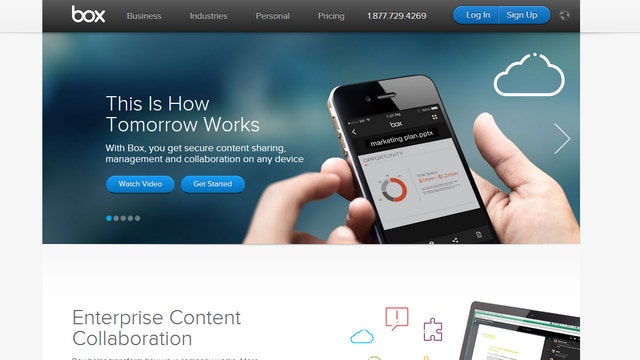Box Set to Face Financial Headwinds, Big Competition as Public Company
After 10 months of delays, Box began trading at $20.20 Friday morning, a 44% premium from the $14 per-share level it priced at Thursday night.
As it moves forward, the cloud storage company and its quirky 30-year-old co-founder and CEO Aaron Levie will continue to face challenges internally and externally that could adversely impact the road to expanding its services and satisfying investors.
Much has changed since Box originally filed to go public early last year. It has spent the last several months improving internal financial health in an attempt to change the company’s trajectory. The company’s overall losses have decreased as revenue spiked 70% year over year to $57 million in the quarter ending October 31, according to the company's filing. In July 2014, it raised a $150 million funding round from TPG Growth and Coatue Management.
“We decided if we can raise in part some of that capital from the private market and give us more time to evaluate the landscape and see when things stabilize, it would be a much stronger outcome,” CEO Levie told FOX Business in an interview in Aspen, Colo., last July.
A Rough Road Ahead?
However, Box is still navigating rough waters. Although financials have improved, Box’s overall valuation has dropped. Sales and marketing costs continue to weigh negatively on the minds of potential investors, despite narrowing losses. Plus, Box has no plans to turn a profit anytime soon.
"We have a history of cumulative losses and we do not expect to be profitable for the foreseeable future," the company wrote in its S-1 filing.
Rapid Ratings, a financial health ratings firm, assigned Box a “very unimpressive 23” out of 100, which is the bottom half of the “high risk” group.
“It’s not clear they are on a medium- to long-term healthy track," Rapid Ratings CEO James Gellert told FOX Business.“It’s probably the first tech IPO in a while that has been arguably priced to sell. It looks like they’ve got to come to market...It’s always a red flag, particularly for a tech company.”
As Box attempts to diversify its offerings and build up business, questions about whether or not it can stay ahead of fast-approaching competition loom large. Box faces start-ups and well-endowed tech giants alike, including Google (NASDAQ:GOOGL), Microsoft (NASDAQ:MSFT), EMC (NYSE:EMC), and Citrix Systems (NASDAQ:CTSX), all cited in Box's SEC filing. The Los Altos, Calif.-based company said it expects threats “to intensify in the future.” Amazon’s (NASDAQ:AMZN) growth in cloud storage also lurks from behind, while start-ups including Dropbox are also poised to increase market share, as some analysts consider it more consumer-friendly.
“To just be another storage company, it’s becoming a commoditized business,” Gellert said. “They have to differentiate themselves from the competition. If they’re able to do it, investors will have an interesting company or their investment will be in an interesting acquisition target…If they struggle, they’re going to find themselves in a lot of trouble.”
The Box Value Proposition
On the up side, Box says it counts 99% of Fortune 500 companies among its total 32 million users. Forty-eight percent of those Fortune 500 are paying customers, and among the 44,000 total enterprises that buy Box subscriptions. In July, Box removed all size restrictions on storage for enterprise customers, including General Electric (NYSE:GE).
Despite its youthful CEO, Box has been working on cloud storage for about a decade.
“Even among the incumbents, we’ve been focused on this longer than anyone else in the industry,” Levie told FOX Business last July. “We have one of the biggest R&D and technology operations just applied to this problem.”
Levie projected Box will continue to lower its sales marketing costs and increase efficiency.
“In every year up to this point, we’ve been moving very aggressively in going after the world’s enterprises and we’re fortunate now to be at a point where the size of the revenue and the size of recurring revenue is at a scale where we’re getting more efficiency and leverage in the business model,” Levy said in July.
Box is also more liquid compared to last year. In the quarter ending October 31, 2014, Box said it had $165.3 million in cash on hand. That was up from $108.9 million at the end of January 2014.
“We feel confident that our cash position will more than cover our cash needs through profitability," Box co-founder and CFO Dylan Smith said in the company's roadshow video.
Despite the headwinds, Box investors have displayed confidence in the company’s future. None of its investors – including Levie and investment firm Draper Fisher Jurvetson, which will hold a 19% stake in the company after the IPO – are selling shares when Box goes public. In a SEC filing on Thursday, Box announced that Coatue Management will purchase as much as 10% of shares at the initial public offering price.
Not only that, but enterprise software IPOs have performed in the last 12 months. Zendesk, New Relic and Hortonworks have trended higher since their respective market debuts. Investors also seem increasingly comfortable with subscription software firms that lose money. Salesforce and Workday have posted losses in the tens of millions of dollars.
Looking ahead, a lot will ride on Box’s first quarterly earnings report.
“The issues for investors in a month, in a quarter or in a year will be about watching the overall the space and Box’s position in it…the big question for their financial health will be how much more efficient they can make the company in the drive for profitability. Can they outperform expectations on that path? A slip would be really detrimental. A company that still makes significant losses has a lot of ground to make up,” Gellert said. “The best thing you can say is they don’t have much to default on, so they’re resilient.”




















